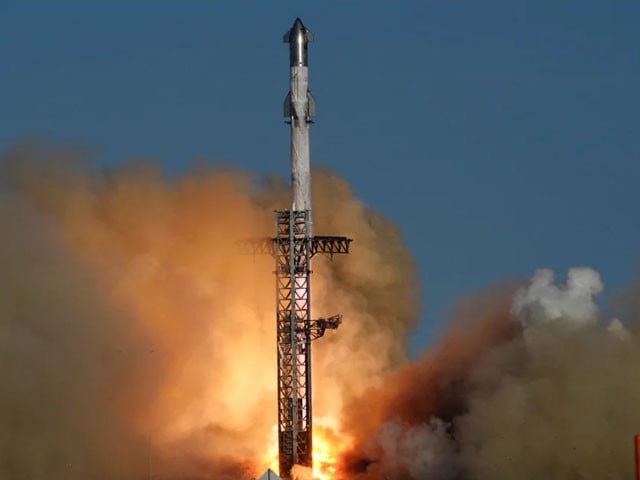
SpaceX readies landmark Starship test flight for Jan 16
SpaceX is preparing for the seventh test flight of its Starship system, the world’s most powerful rocket, designed to advance human space exploration. The nearly 400-foot (121-metre) rocket is set to launch from SpaceX’s Starbase in Texas no earlier than 5 pm ET on Thursday. The flight, delayed by weather, aims to test key upgrades, including enhanced reusability and satellite deployment capabilities. NASA has contracted SpaceX to use Starship as a lunar lander for missions slated to begin in 2027, contributing nearly $3 billion for its development. This mission will showcase an upgraded propulsion system, increasing the propellant volume by 25% to support longer engine burns. SpaceX will also test satellite deployment, using simulators resembling its next-generation Starlink satellites. The Starship spacecraft, designed for reuse, is expected to splash down in the Indian Ocean after completing its objectives. The Super Heavy booster will attempt a precision landing using the “Mechazilla” system, massive tower arms designed to catch and recycle the booster. For the first time, a Raptor engine from a prior mission will be reused, marking a significant step in SpaceX’s strategy to reduce costs and minimise turnaround times between missions. “Testing the ability to fly Raptor engines multiple times is a key milestone,” SpaceX said in a statement. Enhanced protections have also been added to Mechazilla following a failed landing attempt last November, when damaged sensors led to the booster splashing down in the Gulf of Mexico. Elon Musk, SpaceX’s CEO, has positioned Starship as the centrepiece of his vision to send humans to Mars. The company plans to conduct hundreds of test flights and perfect in-orbit refuelling before undertaking a crewed mission. “Starship will stay in space for long-duration missions to the Moon or Mars, or serve as tankers for refuelling,” SpaceX engineer Jessie Anderson said. The accompanying Super Heavy boosters will return for rapid reuse. Since the programme’s inception in April 2023, SpaceX has refined Starship’s capabilities, moving from explosive test flights to controlled landings. However, critical milestones, such as achieving orbit and demonstrating vehicle rendezvous for refuelling, remain. Construction is underway on a “Starfactory” at Starbase, intended to mass-produce hundreds of Starship vehicles annually. “It might sound crazy, and that’s because it is,” SpaceX engineer Kate Tice said. As SpaceX pushes the boundaries of technology, this test flight will provide crucial data for its ambitious goals, including returning humans to the Moon and eventually reaching Mars. The launch will be livestreamed on SpaceX’s website and social media platforms.

SpaceX is preparing for the seventh test flight of its Starship system, the world’s most powerful rocket, designed to advance human space exploration. The nearly 400-foot (121-metre) rocket is set to launch from SpaceX’s Starbase in Texas no earlier than 5 pm ET on Thursday. The flight, delayed by weather, aims to test key upgrades, including enhanced reusability and satellite deployment capabilities. NASA has contracted SpaceX to use Starship as a lunar lander for missions slated to begin in 2027, contributing nearly $3 billion for its development. This mission will showcase an upgraded propulsion system, increasing the propellant volume by 25% to support longer engine burns. SpaceX will also test satellite deployment, using simulators resembling its next-generation Starlink satellites. The Starship spacecraft, designed for reuse, is expected to splash down in the Indian Ocean after completing its objectives. The Super Heavy booster will attempt a precision landing using the “Mechazilla” system, massive tower arms designed to catch and recycle the booster. For the first time, a Raptor engine from a prior mission will be reused, marking a significant step in SpaceX’s strategy to reduce costs and minimise turnaround times between missions. “Testing the ability to fly Raptor engines multiple times is a key milestone,” SpaceX said in a statement. Enhanced protections have also been added to Mechazilla following a failed landing attempt last November, when damaged sensors led to the booster splashing down in the Gulf of Mexico. Elon Musk, SpaceX’s CEO, has positioned Starship as the centrepiece of his vision to send humans to Mars. The company plans to conduct hundreds of test flights and perfect in-orbit refuelling before undertaking a crewed mission. “Starship will stay in space for long-duration missions to the Moon or Mars, or serve as tankers for refuelling,” SpaceX engineer Jessie Anderson said. The accompanying Super Heavy boosters will return for rapid reuse. Since the programme’s inception in April 2023, SpaceX has refined Starship’s capabilities, moving from explosive test flights to controlled landings. However, critical milestones, such as achieving orbit and demonstrating vehicle rendezvous for refuelling, remain. Construction is underway on a “Starfactory” at Starbase, intended to mass-produce hundreds of Starship vehicles annually. “It might sound crazy, and that’s because it is,” SpaceX engineer Kate Tice said. As SpaceX pushes the boundaries of technology, this test flight will provide crucial data for its ambitious goals, including returning humans to the Moon and eventually reaching Mars. The launch will be livestreamed on SpaceX’s website and social media platforms.
